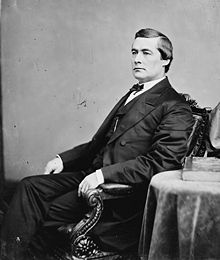Edmund G. Ross
| Edmund Gibson Ross | |
|---|---|
 |
|
|
United States Senator from Kansas |
|
|
In office July 19, 1866 – March 3, 1871 |
|
| Preceded by | James H. Lane |
| Succeeded by | Alexander Caldwell |
| 13th Governor of New Mexico Territory | |
|
In office 1885–1889 |
|
| Nominated by | Grover Cleveland |
| Preceded by | Lionel Allen Sheldon |
| Succeeded by | L. Bradford Prince |
| Personal details | |
| Born |
December 7, 1826 Ashland, Ohio, U.S. |
| Died | May 8, 1907 (aged 80) Albuquerque, New Mexico Territory, U.S. |
| Political party | Republican, Democrat |
| Military service | |
| Service/branch | Union Army |
| Years of service | 1862–1865 |
| Rank | Major |
| Battles/wars | American Civil War |
Edmund Gibson Ross (December 7, 1826 – May 8, 1907) was a politician who represented Kansas after the American Civil War and was later governor of the New Mexico Territory. His vote against convicting President Andrew Johnson of "high crimes and misdemeanors" allowed Johnson to stay in office by the margin of one vote. As the seventh of seven Republican U.S. Senators to break with his party, Ross proved to be the person whose decision would result in conviction or acquittal. When he chose the latter, the vote of 35–19 in favor of Johnson's conviction failed to reach the required two-thirds vote. Ross lost his bid for re-election two years later.
Edmund Gibson Ross was born in Ashland, Ohio, and attended high school in Sandusky, Ohio. He worked in the newspaper business, first in Sandusky, Ohio, then in Milwaukee, Wisconsin and Topeka, Kansas. After the suicide of James H. Lane in 1866, Ross was appointed and then elected to the United States Senate as a member of the Republican Party. He became a Democrat in 1872.
He was a Union army veteran and hero. A captain in the Eleventh Kansas Infantry, and later when the regiment became mounted cavalry, Ross had two horses shot out from under him during the skirmishing before the Battle of Westport.
Ross is best known for casting the decisive vote which acquitted Andrew Johnson during his 1868 Presidential Impeachment trial. Some people have claimed that Ross voted against the conviction due to concerns about his colleague Samuel C. Pomeroy receiving patronage from Benjamin Wade, and as a means to receive patronage favors from Johnson. Others claim Ross cast his vote because he genuinely believed that Johnson had the right to replace Edwin M. Stanton, since he had been appointed during the Lincoln Administration. Still others give voice to the opinion that, though the Kansas Senator did believe Johnson guilty of breaking the Tenure of Office Act, he did not believe that offense worthy of impeachment. Kansas newspapers thought clearly that Ross voted against his radical leanings in supporting Johnson because of the influence of his old Colonel in the civil war, Thomas Ewing Jr., an ardent Johnson supporter at the time. Later in life, Ewing wrote Ross that he felt Ross was “preeminent for courage” among men – not only for his physical courage in battle but also for opposing Johnson’s impeachment. “In making [that] decision, you knew perfectly well that it could consign you to private life and the vehement denunciation of almost all your party friends.” However, there is significant evidence that suggests Ross was bribed.
...
Wikipedia
